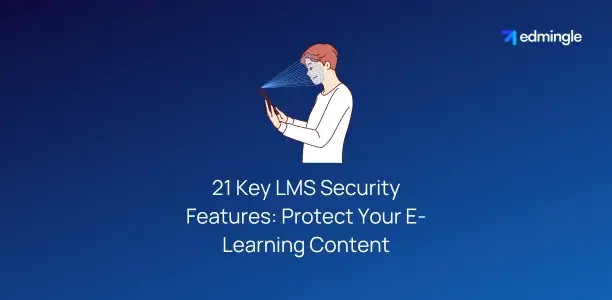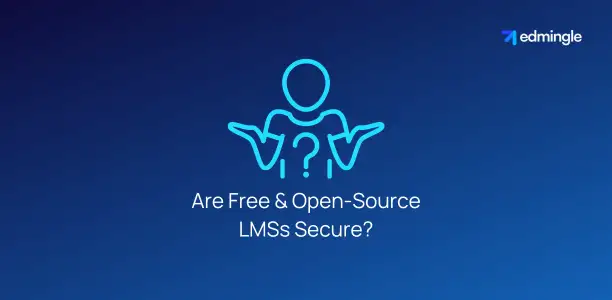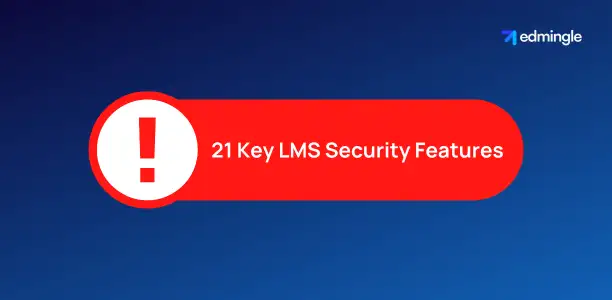
LMSs have revolutionized learning. Opening doors to knowledge for everyone, everywhere.
Yet, as we sail through this expansive sea of e-learning. The question of how secure our virtual classrooms are, is crucial.
In this blog, we’ll explore the importance of LMS security features. While delving upon best practices to secure your LMS.
Why are LMS Security Features Important?

Since an LMS is a treasure trove of information. The emphasis on LMS security features is crucial to protect personal student data, grades, and feedback. And additionally to safeguard proprietary course materials crafted by educators.
- Unauthorized access to the LMS could lead to data breaches. Thereby, compromising the privacy of students and educators alike.
- Intellectual property, in the form of unique course content, could be stolen or tampered with.
- Moreover, without robust LMS security features, the platform could be vulnerable to malicious/ransomware attacks. Hence, disrupting the learning process and eroding trust.
LMS privacy features aren’t just about safeguarding data. They also ensure that education continues uninterrupted.
5 Benefits of LMS Security Measures
Learning management systems, via online courses, offer unparalleled convenience and accessibility. But it also brings forth unique challenges. Especially in privacy and security.
Let’s break down why these aspects are non-negotiables.
| 1.Protection of Personal Data | Accessing an LMS requires students to share sensitive information. From basic contact details to payment credentials. Ensuring the privacy of this data isn’t just a matter of trust. But also a legal obligation. |
| 2.Preserving Intellectual Property | Educators invest significant time and effort into creating unique & valuable course content. Without security, this content is at risk of theft or unauthorized distribution. |
| 3.Maintaining Course Integrity | A secure LMS ensures that assessments, quizzes and exams are conducted fairly. It prevents cheating, unauthorized access or tampering with results. Thereby, ensuring that certifications and qualifications maintain their credibility. Also read: Overcoming challenges in online assessments and proctoring. |
| 4.Building Trust | For learners and trainers, the assurance that their data is safe & uncompromised, is crucial. Trust is the foundation of any relationship, and robust security strengthens it. |
| 5.Avoiding Disruptions | Malicious attacks or breaches can lead to downtimes or loss of data. For a student on a tight deadline or an educator managing multiple courses. Such disruptions can be detrimental. |
LMS security measures help create a safe, trustworthy and efficient learning environment. As we move further, we’ll see how they work to uphold these principles.
Are Free & Open-Source LMSs Secure?

Free & open-source platforms often stand out as attractive options. But the most common question around them is: How secure are they?
Security & Privacy in Free LMSs
Free LMS platforms might not always prioritize high-end security features due to budget constraints. This doesn’t mean they’re inherently insecure.
But they might lack advanced security measures like DRM encryption or anti-piracy packs. It’s essential to thoroughly review their privacy policies. And understand what protections are in place before committing.
Security & Privacy in Open-Source LMSs
Open-source LMSs offer a unique advantage. It’s the community-driven model. This means that a global community of developers can identify vulnerabilities and patch them.
However, since everyone has access to the source code. The responsibility of maintaining security often falls on the user. Furthermore, hiring a tech expert for regular updates & security configurations becomes crucial.
Also Read:
21 Key LMS Security Features

As e-learning is becoming the norm, LMSs aren’t just a platform. But think of it as a vault of sensitive data, intellectual property and user interactions.
Here’s a comprehensive list of the 21 key LMS security features.
1.SSL (Secure Socket Layer)
SSL encrypts the data transferred between the user’s browser and the LMS’s remote access server. Hence, ensuring that login credentials and personal data remains private & protected.
2.Two-Factor Authentication (2FA)
This ensures the authenticity of users registering on the LMS. It may involve email verification & CAPTCHA integration.
This adds an extra layer of security to the login process. In addition to entering their password, users are required to provide a second form of identification.
| 1.If the second form requires a password or phone, it’s known as multi-factor authentication (MFA). | 2.If it requires fingerprints or facial recognition, it’s biometrics authentication. | 3.If it sends a one-time token or code, it’s known as token-based authentication. |
3.Single Sign-On (SSO)
SSO allows users to log in just once. With a single password, it provides access to multiple applications and platforms. Hence, simplifying the user experience and reducing any password-related breach.
4.Complex/Advanced Password Requirement
By enforcing strong password policies, users are encouraged to set robust, hard-to-crack passwords. The use of special characters in passwords minimize the risk of unauthorized access.
5.Data Backup & Storage
This ensures all user data is stored in secure, encrypted databases. Including personal information and course progress.
6.Locked Content
This LMS security feature restricts access to certain content. Ensuring that only authorized users can view/access it.
7.User Roles, Access & Permissions Management
Administrators can assign specific roles to users. This further determines what they can view or modify within the LMS. Hence, ensuring that sensitive areas remain protected. This also includes secure access from mobile devices & mobile user authentication.
8.System Audit Logs
A record of all system activities helps administrators track user behavior. From logins to file uploads, it helps identify any suspicious or unauthorized actions.
9.GDPR Compliance
For LMSs catering to European users, adhering to the General Data Protection Regulation is crucial. It ensures user data is handled with utmost care and transparency.
10.IP Blocker
By blocking specific/unwanted IP addresses or ranges, administrators can prevent access from malicious sources. Or regions/networks known for high cybercrime rates.
11.Anti-Spam
This feature filters & blocks spam content or malicious bots from the internet. Thereby, ensuring the platform & training programs are user-friendly & free from unwanted content.
12.Email Domain Based Registrations
Restricts registrations to specific email domains. It’s ideal for corporate training or educational LMSs where only particular members should have access to systems.
13.Anti-Virus
Regularly scans uploaded files for malware or viruses. Hence, ensuring that harmful content doesn’t infiltrate the platform.
14.Consistent Data Backups
By regularly backing up data, user data and course content can be restored without loss. It’s helpful in the event of a system failure or breach. Most systems today provide regular nightly backups.
15.Data Encryption
All sensitive data, whether at rest or in transit, is encrypted. Advanced encryption standard ensures data remains unreadable to unauthorized users or potential interceptors. This encrypted data can only be viewed/accessed via a decryption key.
16.Regular Updates
Administrators consistently update the LMS software. This ensures the platform is equipped with latest security patches, features and improvements.
17.Watermarks
Watermarks are often invisible & embedded into content. If content is shared without permission, the watermark can identify the source. Thereby, deterring unauthorized distribution & ensuring your content doesn’t go in wrong hands.
18.Document & User Privacy
Ensures that user profiles, interactions and uploaded documents remain confidential. And can be viewed only by authorized personnel.
19.Emergency Response
In the event of a breach or threat. The LMS should have protocols in place for immediate action to minimize potential damage.
20.Screenshot & Recording Protection
Prevents people from capturing the screen. It also ensures that content can’t be easily copied or shared without permission.
21.Digital Rights Management (DRM)
Protects the copyrights of digital content within the LMS. This prevents unauthorized sharing, copying or distribution.
With these 21 LMS security features, your platform is ready for an effective implementation.
5-Step Guide to Choose the Right LMS Privacy Features
In the vast realm of e-learning, LMSs stand as the backbone. Supporting educators, learners and administrators alike.
And with any digital platform, security policies are paramount. In this step-by-step guide, we help you find the right LMS privacy features for your needs.
| Step 1: Ask the LMS vendor about the safety measures in-place. Begin your journey by directly inquiring about the security features your LMS vendor offers. A transparent vendor will provide detailed insights into methods, standards, protocols and measures they’ve implemented. |
| Step 2: Take a free trial of the LMS to test the security features firsthand. Before committing, take advantage of any free trials or free demo versions. This allows you to personally gauge the platform’s security robustness. Ensuring it aligns with your requirements. Our blog on LMS Demo might give you detailed information on why demos are so important. Before selecting & implementing an LMS. |
| Step 3: Consider the costs associated with data theft and virus removal. While budgeting for an LMS, potential costs related to breaches are a critical factor. This includes data theft or malware removal. Investing in a secure LMS upfront can save significant expenses. Apart from reputation damage in the long run. For more info on this aspect, read our blog on LMS Pricing. |
| Step 4: Keep a check upon regular audits & whether you’re prepared for risks. Engage with your in-house IT or security experts. Their insights on regular security audits, security vulnerability assessments and risk mitigation strategies are valuable. Especially in maintaining a secure LMS environment. |
| Step 5: Review the security for all integrations of your LMS. If the LMS integrates with third-party tools or plugins. Ensure each one adheres to high security standards. A chain is only as strong as its weakest link; the same applies to integrated systems. Also Read: Best LMS with Zoom Integration. |
In short, choosing the right LMS security features is crucial. It requires vigilance, regular updates and proactive measures.
Summary
In our exploration, we’ve navigated through the critical importance of security within learning management systems.
And realized that LMS security features play a pivotal role. These are the foundation that ensure digital classrooms remain safe havens for educational growth.
Protecting student data, course materials and ensuring the integrity of assessments becomes an indispensable need. Especially amidst such a data-rich world.
Selecting the right LMS security features can create a learning environment. One that is not only efficient and accessible. But also secure and trustworthy.
FAQs on LMS Security Features
1.How often should I update my LMS to ensure it remains secure?
It’s advisable to update your LMS whenever a new version or security patch is released. This ensures that the platform is equipped with the latest security enhancements. To counter any emerging threats.
2.Can I customize the security settings of my LMS?
Most modern LMS platforms allow administrators to customize security settings. This may include user permissions, domain restrictions and data access controls. However, this varies from vendor to vendor.
3.How can I ensure that the third-party tools integrated with my LMS are secure?
Before integrating any third-party tool, research its security features. Also, read user reviews and consult with your IT team. Ensure that the tool complies with industry standards and regularly updates its security protocols.
4.How do I handle a security breach in my LMS?
In the event of a breach, immediately notify your IT/security team. Assess the extent of the breach & inform affected user accounts. Then, restore from a secure backup protocol if needed. And strengthen security measures to prevent future incidents.






Leave a Reply